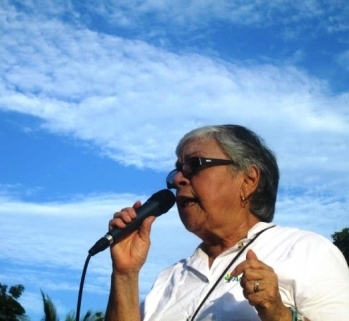
Carmen Hortencia García, Ameyali’s Principal, talks about her experience as a Mexican and as a teacher through the Project “Caras de México”.
What is Mexico for you?
Mexico is a country of contrasts because on one hand we have a wealth of biodiversity: mountains, desert, coast, plains and rivers. We have everything in our landscape. And we have an impressive cultural diversity that is recognized and admired amongst other countries.
But we also have the world's richest men and most abusive poverty.
For me, Mexico is a mosaic of smells, tastes, sounds, colors ... All that is Mexico. My childhood friends, my parents, their origins, my national pride, my memories… for me that is Mexico.
What do you say when talking about education in Mexico?
First I say that the government is pushing education, in fact, the budget devoted to education is one of the highest in Latin America. But there is lack of financial resources and of will, responsibility, commitment, skill and passion because the resources devoted to education are misused because of corruption.
What is the biggest challenge facing education in Mexico?
To transform our people from being spectators to becoming players. That should be our challenge. For taxpayers to participate and assume our responsibilities as citizens and not leave the work only to the government but for all of us to take responsibility in this transformation to change our country.
What do you think has been the biggest change we've seen in the education system in the last six years?
I think there have been changes constantly, not just through the last 6 years. I started my teaching career in 63 'and there have been few governments in office where there has not been reform, transformation, innovation plans and programs. Our curriculums have always been innovative but the problem is to implement them. The use of technology has also transformed education. School networks have been created and have reached the farthest corners of our country and through such programs we have implemented the SEP. And something I feel is special is textbooks that are published regional dialects for different communities. All this is has not just happened in the last six years. We have a history of concern for improving the quality of education in Mexico, but corruption is what prevents us from moving forward.
As a Mexican, what do you think we need to understand or change in the country?
Our mindset, our attitude. It is the government that has to change, and each and every one of us must participate in the transformation of our country. Our current attitude is that we want everything resolved automatically and effortlessly. In fact, I hear that there are many social support programs for people who really need it, but they also have collateral damage because there are people who abuse the system, who no longer want to work, who do not want to be productive. It's a double-edged sword. There are many people who go to government offices to see what programs exist so that they can enroll immediately.
What do you think is the biggest challenge for Mexico as a country?
To stop being a nation of passive viewers and become a nation of citizens with commitment, the desire to transform our society and not just criticize. Work with our government, not just accusing but helping them and track down and eradicate corruption. We as teachers have a responsibility to awaken in our students that awareness. We have some beautiful books promoting citizenship through action and a commitment to participate in the transformation of our country. Hopefully this new government will bring changes, but there are definitely broadcasters governing the consciences of citizens.
What makes you proud to be Mexican?
Our culture, our cultural events, our language. I am proud that indigenous dialects still exist because language is the most important part of any culture and we must encourage children to not reduce their language to just "cool" or "dude". We need to awaken pride in ownership of this beautiful language through reading and that we still have Nahuatl literature is another reason why we should feel proud.
I am proud to have been born in El Tuito: A magical place, a place where the only sounds I heard were those of nature, no cars, no anything. An isolated village that was accessible only on foot or horseback. That marked my life because you could appreciate the smells, the sights and all the beauty of nature.
Describe a defining moment in Mexico's history:
I'll describe two moments:
A) The Conquest because Mexicans still carry the mark of it, the tattoo of corruption, since we were conquered by the Spanish and Arabic at that time and imprisoned. . Unscrupulous people, people with a very low moral quality came and marked us. And there were also people who were kind like the friars who gave their lives for the Indians, but those with power in the church and the army and government were people whose ethical and moral values ​​left much to be desired. I think this is in our
B) When World War II ended and Mexico began to transform from predominantly rural villages to an urban towns, the industrialization that began under President Miguel Aleman, which began the migration from the countryside to the city. That changed to cultural events and started the creation of a modern Mexico.
Your favorite Mexican traditional dish:
I love corn tamales, right from the pot, and all Mexican dishes like pozole, tostadas, everything.
Interview with Hortencia García for Caras de México. Click here to read more interviews examining Mexican identity.